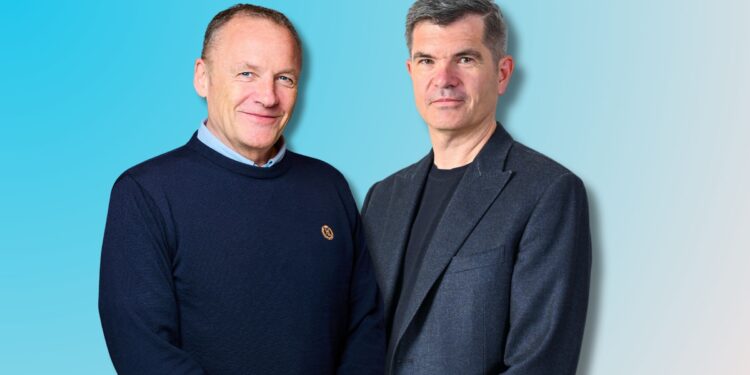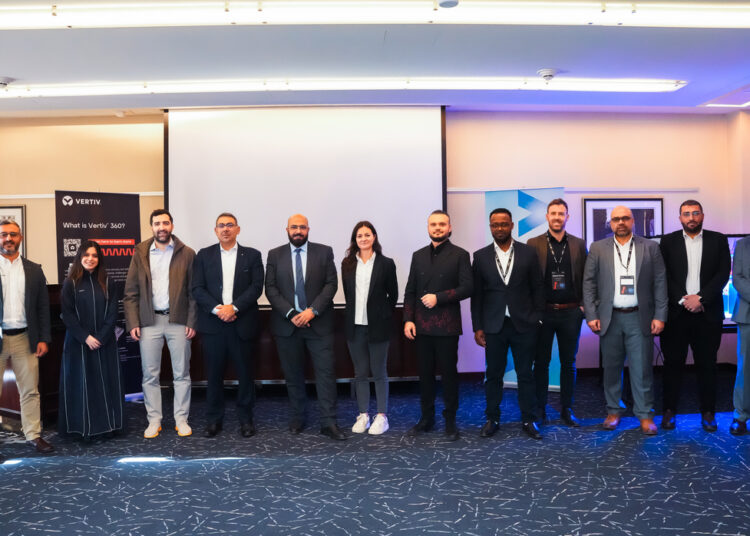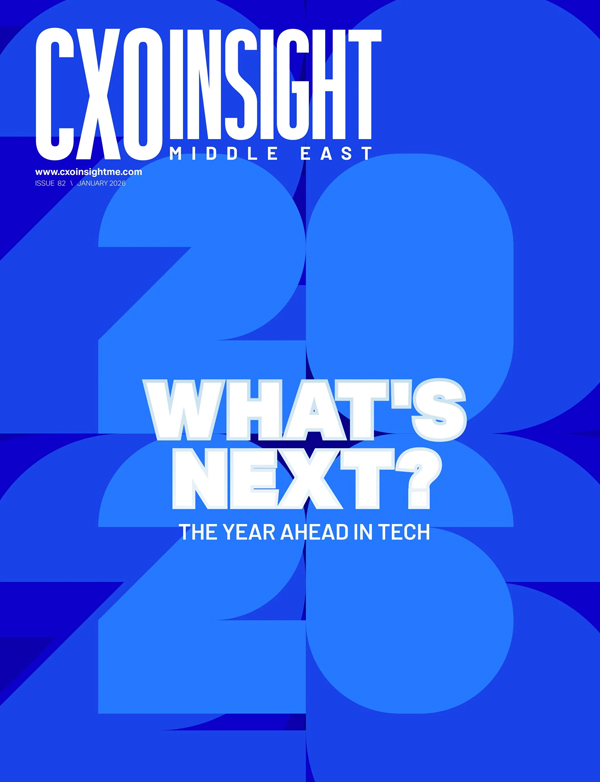What have been some of the standout milestones for IFS over the past year, and how are these shaping the way you create and deliver value for customers across global markets?
Christian Pedersen (CP): Over the past year, the most exciting development has been the launch of our next generation of solutions based on a native AI platform. We’ve fundamentally transformed our offerings to capitalise on AI, and the opportunity this creates for our customers is phenomenal.
We recently kicked off our Connect event series in the UK, where we showcased what’s available today — not just future plans. The feedback from customers has been overwhelmingly positive seeing the value of over 200 AI-powered solutions come to life, demonstrating IFS’s commitment to embedding AI across the IFS Cloud product suite. We are looking forward to continuing that momentum at the Riyadh leg of IFS Connect.
Hannes Liebe (HL): From my perspective, the major highlight was IFS’ acquisition of Copperleaf. It filled a crucial gap, enabling us to offer true end-to-end Enterprise Asset Lifecycle Management — from initial capital planning through to asset operation, service, and decommissioning.
For the regions I oversee — the Middle East, Africa, and Asia Pacific Japan — which are dominated by asset-heavy industries, this capability is a real differentiator. It allows us to support customers across the entire lifespan of their assets, which is increasingly critical as industries rethink how they drive long-term value. Having it all in one platform also allows advanced technologies like AI to dramatically improve outcomes for our customers.
When you look at how these latest innovations are being embraced in places like Saudi Arabia, Japan, Singapore, or Kenya, the motion is very similar. These regions are moving fast, and the appetite for transformation is high. While there are certainly local nuances, our industry-specific approach — combined with local execution — is what makes it work so effectively across such diverse geographies.
Given the breadth of the regions you cover, how do customer priorities and technology adoption patterns compare between markets like the Middle East and Asia Pacific?
HL: I’d say there are more similarities than differences if you focus on the right dimensions. Firstly, IFS is industry-specific. Whether you’re a shipbuilder in the UAE or Australia, the operational challenges are largely the same. Industry focus transcends geographic differences.
Secondly, emerging markets like the Middle East and APJ regions are fast adaptors of innovative technologies as they don’t have the legacy infrastructure issues that mature markets face. Technologies like Industrial AI resonate just as strongly in Saudi Arabia as they do in Japan or Kenya. The appetite for transformation is palpable.
Finally, while we operate globally, we execute locally. Cultural nuances — how you engage with customers, how decisions are made — absolutely matter. That’s why we invest in local teams and delivery capabilities on the ground.
CP: I would add that while industries operate similarly, adoption models — like cloud infrastructure — can vary greatly. Regulatory environments in different regions influence how customers consume technology.
At IFS, we built our platform with flexibility at the core. Whether a customer wants to deploy on a private data centre, a public cloud, or an IFS-managed environment, they get the same industry capabilities. This lets us scale globally while meeting local needs.
How is IFS supporting asset-intensive organisations as they navigate growing complexity and accelerate their digital transformation efforts?
CP: When we speak with customers today, they’re facing very different realities depending on where they are in their digital transformation journey — and this shapes how we engage with them.
On one side, we have customers who are already operating on IFS Cloud. These organisations have moved beyond siloed systems and now leverage a composable platform with a unified data model. They’re no longer thinking in terms of ERP, EAM, CRM, or field service — they’re solving business problems end-to-end through connected data and integrated workflows.
Take asset management, for instance — it’s not only about tracking assets. It’s about coordinating field operations, verifying certifications, optimising resources, and responding in real time. Our AI-powered scheduling engine manages over 400,000 technicians globally every day — delivering measurable operational impact.
Others are just beginning their transformation, constrained by fragmented systems and siloed data. Without unified, accessible data, it’s difficult to scale or adopt AI-led innovation.
That’s why IFS Cloud is open by architecture and API-first by design. Every capability — including our frontend, optimisation engines, and IFS.ai Copilot — runs on the same foundation. This enables customers and partners to build and extend with speed and confidence.
HL: To build on that, the complexity isn’t just technical — it’s also commercial. A major shift across asset-intensive industries is the move from product-centric to service-centric value creation.
Traditionally, companies sold equipment, with support as a secondary offering. Now, after-sales services are becoming primary revenue drivers — sometimes surpassing the original sale. This redefines how companies approach service management.
Servicing an asset today is about continuous value delivery, customer satisfaction, and sustainability with zero down time is in many use cases table stakes. This shift plays directly to our strengths at IFS. Our platform offers world class asset management and servicing – within a single, unified system. That is unique in the market and the reason why industry analysts have been giving us the highest ratings.
Ultimately, enhancing service delivery drives profitability, strengthens customer loyalty, and reduces environmental impact — all at once. With IFS, that transformation is not just possible, but very practical. And AI embedded into it is usable from day one.
How is the intensifying global talent shortage across industries impacting customers, and what role does AI play in addressing these challenges?
CP: We’re seeing a growing urgency around productivity, driven by a structural shift in the global workforce. In many developed and emerging economies, populations are ageing and shrinking — this isn’t just a temporary skills gap.
Take Thailand, for example: its population is expected to fall from 67 million today to 40 million by 2050. Similar trends are unfolding across Asia and Europe. Businesses can no longer assume they’ll scale by hiring more people — they need to do more with the same or fewer resources. That’s where software, and especially AI, becomes critical.
As a lifelong software professional, I see AI’s true value in scaling human capacity — not just automating tasks. With our AI-powered scheduling optimisation, customers are already achieving over 30 percent productivity gains across maintenance and field service. That level of efficiency is a game-changer in today’s environment.
HL: To put that in perspective, look at workforce demographics. Japan today has the oldest workforce globally, with an average age of 49. Globally, the average is closer to 30. That’s a huge gap.
In asset-intensive sectors like manufacturing, aerospace, energy, and utilities — where skilled field technicians are essential — an ageing workforce poses a major challenge. With fewer qualified technicians, maximising productivity and eliminating inefficiencies becomes critical.
That’s where intelligent service management and AI-powered scheduling are no longer optional — they’re essential to keeping operations running amid shrinking talent pools.
This is where IFS stands out. Built for asset-heavy industries including Utilities, Telcos, or Oil and Gas, our platform has always focused on managing complex operations with precision. Now, with AI embedded throughout, we’re enabling customers to respond with speed and agility.
What some see as demographic headwinds, we see as tailwinds — making the impact of what we deliver more relevant and urgent than ever.
How are you seeing AI adoption evolve among your customers, and what strategies are helping organisations integrate AI more confidently into their operations?
CP: We’re seeing a lot of excitement rather than hesitation. For customers already on IFS Cloud, AI isn’t treated as a separate or optional layer — it’s embedded throughout the platform. By May, over 200 AI-powered capabilities will be live and seamlessly integrated into daily operations.
Within six months, I expect the conversation around “using AI” will disappear. Like expecting a graph to appear in an interface, AI will become invisible but indispensable.
We’re also advancing into agentic AI — digital workers embedded in workflows. For example, our scheduling agent continuously monitors work orders, weather, traffic, and technician availability to optimise schedules in real time.
Crucially, we give customers control over AI autonomy. They can begin with AI-generated recommendations, keeping humans in the loop, and gradually shift toward more autonomous operation as trust builds. That flexibility is key to adoption at each customer’s pace.
HL: Building trust is absolutely key. Many of our customers prefer to begin by using AI as an advisor to their decisioning — e.g. assisting a human scheduler of service orders with optimisation suggestions but leaving the final decision to the human.
However, as they see the AI consistently making accurate and valuable recommendations, confidence naturally grows. Over time, we see customers becoming more comfortable allowing AI to operate independently in areas where it can have the biggest impact. That gradual, trust-based journey toward full autonomy has been very effective across the industries and regions we serve, and we have many customer examples, where this has happened.
Given the critical role of data, how is IFS helping customers turn operational data into real-time insights and unlock greater value from AI?
CP: That’s a critical question — and one that often separates AI ambition from real impact. While industries prioritise different use cases, the value isn’t in AI itself, but in the outcomes, it enables — like productivity gains, reduced downtime, or faster decisions.
Many organisations are excited about AI but feel let down when results aren’t immediate. We aim to close that gap. IFS Cloud is built to deliver measurable, real-world outcomes — not just technology for its own sake.
A good example is our self-service AI application. Customers can explore use cases, apply their own data, and instantly see projected ROI or productivity improvements. It’s embedded in IFS Cloud, so there’s no need for separate deployments.
We also support seamless integration of third-party data to enhance insights. And for custom needs, we offer Nexus Black – our co-innovation initiative, designed to help customers move from idea to value. We work closely with them to prototype and operationalise tailored solutions quickly. If the result is relevant to a broader set of users, we integrate it directly into IFS Cloud. If it’s more specific, they run as secure extensions via open APIs.
Ultimately, our goal is to make AI adoption practical and immediate — turning data into decisions, and ideas into results.
Sustainability is an increasingly critical priority for businesses today. How is IFS helping customers turn their sustainability and ESG ambitions into real business advantages?
CP: Sustainability has evolved from a regulatory requirement to a key driver of business value. It’s no longer just about compliance — it’s about boosting efficiency, building resilience, and driving profitability.
At IFS, we go beyond enabling ESG reporting. While standards are emerging across regions like the EU, China, and Australia and we support them in our platform, we recognise that the real value comes from embedding sustainability into everyday operations.
Optimising workforce productivity or asset maintenance directly reduces emissions by cutting travel, energy use, and downtime. In manufacturing, predictive maintenance and smarter planning help minimise waste and energy consumption — delivering both sustainability gains and business benefits.
We’re also committed to circular manufacturing, helping companies design products for longevity and minimal waste. Through digital passports, we enable full traceability of materials across the supply chain, driving transparency and accountability.
For us, sustainability isn’t a separate layer — it’s embedded into operations, delivering measurable environmental and financial outcomes.
HL: Across the Middle East and Asia Pacific, we’re seeing a clear shift toward sustainable business models, particularly in manufacturing and heavy industry.
Re-manufacturing is a strong example. More companies are recovering used components, restoring them, and reselling them — turning sustainability into a profitable service. In the Middle East, remanufactured truck engines and industrial parts are becoming central to after-sales strategies.
This trend is especially prominent in manufacturing economies like Japan, Korea, Indonesia, and China, but it’s gaining momentum regionally. Businesses increasingly recognise that sustainability and profitability go hand in hand — doing good means doing well.
IFS Connect in Riyadh is set to be a major highlight this year. What made Saudi Arabia the ideal choice for the event once again, and what can attendees look forward to?
HL: The intent behind Connect is very clear for us. First, it’s about creating a platform where business leaders can come together to get inspired, explore the art of the possible, and collaborate on how to turn those possibilities into real actions. Second, it’s about moving quickly from ideas to immediate, tangible outcomes.
We chose Saudi Arabia because the region — including the broader Middle East — is at the forefront of tech adoption. In Saudi and the UAE, some of the world’s most ambitious and innovative projects are already underway. The appetite for transformation here is exceptional.
That makes the Middle East the ideal setting for Connect. The region’s ambition, investment, and openness to innovation align perfectly with IFS’s focus.
This year’s theme, “Industrial AI: The Catalyst for High Performance and Growth,” is about showcasing real, available capabilities — not future roadmaps or hypotheticals. It’s about moving beyond AI hype to demonstrate practical, embedded innovation delivering value now.
We also see a fast-growing talent pool in the region. At AI Week in Dubai, the momentum around AI adoption and skills development was striking. People here aren’t just imagining the future — they’re actively building it.
Beyond hosting platforms like IFS Connect, how else are you supporting national strategies such as Saudi Arabia’s Vision 2030 and the UAE’s Vision 2031?
HL: We’re strongly aligned with the region’s national transformation agendas — whether it’s Saudi Arabia’s Vision 2030 or the UAE’s Vision 2031. These strategies focus on economic diversification, industrial growth, and digital innovation. These areas are where IFS is strongly positioned to contribute.
Take Saudi Arabia’s Vision 2030 goal of establishing 10,000 new manufacturing companies, for example. This bold initiative reflects our core focus and mirrors our own vision of advancing industrial excellence through innovation and technology. With proven expertise across asset- and service-intensive industries such as manufacturing, construction, telecoms, and aerospace, IFS is ready to play a meaningful role in this transformation.
We’re also committed to talent development. As industrialisation accelerates, the demand for a workforce skilled in both operations and emerging technologies like AI continues to grow. We’re building an ecosystem to support the next generation of digital talent.
From enabling advanced manufacturing and smart infrastructure like NEOM to modernising ports and airports, our platforms can play a vital role in delivering national priorities. That shared ambition between IFS and the region makes this a particularly exciting and pivotal time for us.
As we look ahead to 2025, how is IFS evolving both in terms of market presence and product innovation to meet accelerating customer demands?
CP: From a product and innovation standpoint, our focus is on bringing our AI investments to life in real-world, high-impact scenarios. Over the past year, we built a native AI platform and embedded over 200 AI-powered capabilities across IFS Cloud. Now, it’s about applied innovation — helping customers achieve tangible outcomes with AI integrated directly into workflows.
One of the most exciting frontiers is agentic AI — what we call digital workers. These are autonomous agents that can take actions, make decisions, and continuously optimise operations alongside human employees. Imagine every employee having an AI assistant handling tasks, surfacing insights, or executing actions independently.
Of course, these capabilities also introduce new governance requirements. As agents make decisions, organisations must ensure those actions are safe and policy-aligned. That’s why we’ve built access control and governance directly into the platform — especially critical in industrial environments.
HL: Adding to that, I believe we’ll also see a shift in how organisations view AI. Today, the conversation is still focused on the technical aspects of AI such as the models, features, and capabilities. But AI is rapidly becoming commoditised.
The real differentiator won’t be the AI engine itself — it will be how intelligently and contextually AI is applied. That’s where IFS has a real edge. With almost three decades of deep industry experience, we know where AI can deliver the most value.
At the upcoming IFS Connect in Saudi Arabia, this shift will be on full display. We’re going beyond futuristic AI concepts — instead, we’ll be demonstrating AI that’s working today, inside real organisations, delivering measurable results. When AI becomes that seamless and operational, it simply becomes part of how great work gets done.
From a business perspective, the next 12–18 months are about scale — particularly in high-growth regions like the Middle East and Asia Pacific. We’ve opened a new HQ in Riyadh, are hiring local talent, and expanding our delivery and partner ecosystems, including signing a strategic agreement with Saudi Business Machines (SBM).
Saudi Arabia and Japan are now two of our fastest-growing markets — a clear reflection of how well our focus aligns with national transformation agendas. In 2025, we’re scaling that value further with strong local execution, trusted partnerships, and solutions built for the strategic direction of the markets we serve.









Discussion about this post